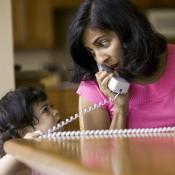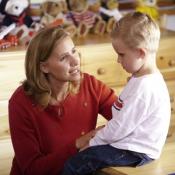 Children who grow up in two-parent families and those who grow up with mothers who choose single parenting fare equally well, according to a study presented at the 33rd annual meeting of the European Society of Human Reproduction and Embryology.
Children who grow up in two-parent families and those who grow up with mothers who choose single parenting fare equally well, according to a study presented at the 33rd annual meeting of the European Society of Human Reproduction and Embryology.
In 1981, Jane Mattes, LCSW, founded the Single Mothers by Choice organization. Mattes developed the organization in part to differentiate older, financially stable single mothers from teen mothers, who typically face a range of sociological and economic challenges. Since 1981, the number of single women who choose to have children has grown. According to data from the 2012 U.S. Census, 30% of American households are headed by single parents. Most of those parents are mothers.
No Difference in Outcomes for Children with Single Mothers by Choice
Some politicians and policy analysts have argued that single motherhood endangers children. This study undermines that claim. It included 69 single mothers by choice and 59 mothers who raised their children in heterosexual two-parent families. The mothers’ children were between 1.5 and 6 years old.
Using three empirically validated questionnaires, the study compared children’s well-being and mothers’ support networks between single and two-parent families. In both types of families, there were no significant differences in emotional investment, parental stress, or problem behaviors in children. Additionally, single mothers reported receiving significantly more social support. They were also more likely to report wanting even more social support.Previous Research on Single Parenting
According to study author Mathilde Brewaeys, policy analysts often base their single parenting research primarily on children of divorce. These children often face an environment of family conflict, making their lives and potential outcomes much different from those of children raised by women who actively choose solo parenting.
Previous research has reached similar conclusions. A 2016 study of 51 single-mother families and 52 dual-parent families found no substantive differences in child adjustment, parent-child relationships, and similar measures of well-being.
References:
- Children in single-mother-by-choice families do just as well as those in two-parent families. (2017, July 5). Retrieved from https://www.sciencedaily.com/releases/2017/07/170705095332.htm
- Golombok, S., Zadeh, S., Imrie, S., Smith, V., & Freeman, T. (2016). Single mothers by choice: Mother-child relationships and children’s psychological adjustment. Journal of Family Psychology, 30(4), 409-418. doi:10.1037/fam0000188

The preceding article was solely written by the author named above. Any views and opinions expressed are not necessarily shared by GoodTherapy.org. Questions or concerns about the preceding article can be directed to the author or posted as a comment below.

 Say It Loud, Say It Proud: Motherhood Is Hard!
Say It Loud, Say It Proud: Motherhood Is Hard! Everyone’s Happiness Counts: The Single Parent’s Guide to Dating
Everyone’s Happiness Counts: The Single Parent’s Guide to Dating Parenting While Anxious: 5 Ways to Cope with Anxiety as a Parent
Parenting While Anxious: 5 Ways to Cope with Anxiety as a Parent

Please fill out all required fields to submit your message.
Invalid Email Address.
Please confirm that you are human.
Leave a Comment
By commenting you acknowledge acceptance of GoodTherapy.org's Terms and Conditions of Use.